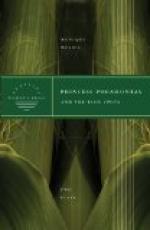“I remember well. Lady Rebecca,” he said, leaning down to kiss her hand, “and I am ever thy most grateful debtor.”
“Call me not by that strange name. Matoaka am I for thee as always. Dost thou remember when I came at night through the forest to warn thee?”
“I remember, Matoaka; how could I forget it?”
“Dost thou remember the day when, lying wounded before thy door, thou didst make me promise to be ever a friend to Jamestown and the English?”
“I have thought of it many a day.”
“I have kept my promise, Father, have I not?”
“Nobly, Matoaka; but it is not meet that thou shouldst call me father.”
Then Pocahontas tossed her head emphatically, and this gesture brought back to Smith the bright young Indian maiden who, for a moment, had seemed to him disguised by the stately clothes of an English matron.
“Thou didst promise Powhatan,” she cried, “what was thine should be his, and he the like to thee; thou calledst him father, being in his land a stranger, and by the same reason so must I do thee.”
“But, Princess,” he objected, “it is different here. The King would like it not if I allowed it here; he might say it was indeed truth what mine enemies say of me, that I plan to raise myself above them.”
“Wert thou afraid to come into my father’s country and caused fear in him and all his people but me, and fearest thou here I should call thee father? I tell thee then I will and thou shalt call me child, and so will I be for ever and ever thy countryman.”
Smith smiled at her eagerness, yet was deeply touched by it.
“Call me then what thou wilt; I can fear no evil that might come to me from thee.”
Pocahontas then spoke a few words to him in the Powhatan tongue, anxious to see if he still remembered it. And he answered her in her language. She was silent, but Smith could see that something was disturbing her.
“What is it, Matoaka; what words wait to cross the ford of thy lips?” he asked.
“They did tell me always,” she replied, “that thou wert dead and I knew no more till I came to Plymouth, yet Powhatan did command Uttamatomakkin to seek thee and know the truth, because thy countrymen will lie much.”
“Think of it no more. Little Sister, if thou still let me call thee that. I am not dead yet and I have many journeys to make. I thank fate I had not yet sailed for that coast to the north of Jamestown they call ‘New England,’ so that I might greet thee once again. When I return we shall have many more talks together.”
“I shall not be here, Father; we too shall set sail ere long. I have been happy here in thy land, but I am now suffering from an illness they tell me is called homesickness.”
“That is an illness which may be easily remedied, Matoaka. But when thou art come again to Wingandacoa forget not the England and the friends which can never forget thee.”




